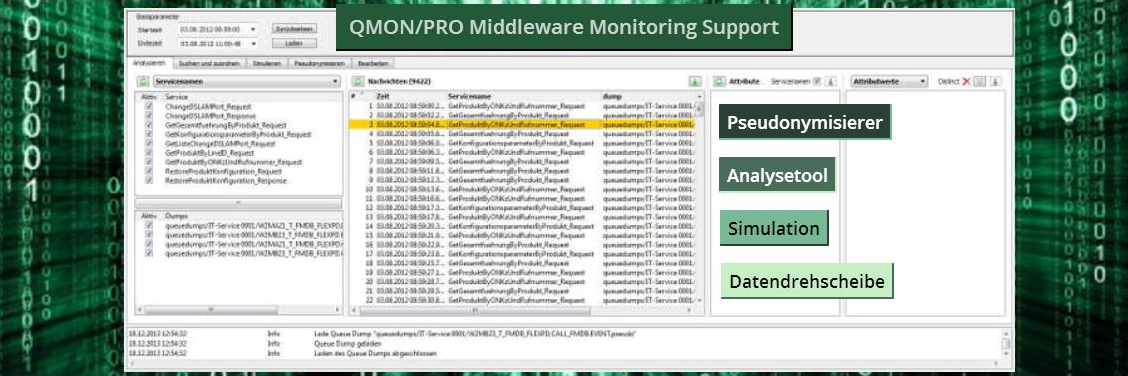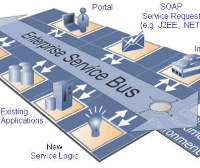

INFRA-XS® MQ BusinessBooster is a tool suite for the setup and operation of central analysis and simulation environments dedicated to the definition and management of monitoring profiles. Profiles to be applied in individual or manufacturer-specific monitoring solutions in the realm of interface- and SOA-based monitoring infrastructures, like, e.g., IBM’s Websphere MQ
MQ BusinessBooster is virtually independent of the deployed monitoring tool, since it generates its output in a transformable meta syntax.
“Why is our automation quote in customer service this low?”
“What’s the reason certain orders are processed much slowlier than others?”
MQ BusinessBooster is a software tool which answers business-related questions by analysing entire technical system chains:
- Only data from the applications’ technical communication are required.
- No complex server installation in the data centre is necessary, only a performant user PC.
- Functional data contents and correlations are identified automatically.
- Extensive analytic functions assist you in answering questions in a business context.
- Data privacy protection is perfectly assured by the integrated pseudonymisation function, with all functional data correlations preserved, though.
- Very large amounts of data can be processed at cyberspeed and used for simulations.

PSEUDONYMISATION |

DATA ANALYSIS |

SIMULATION |
Pseudonymisation [noun]; procedure by which person-related fields within a data record are replaced by artificial identifiers, or pseudonyms, in order to render the data record less identifying. As opposed to anonymisation, all correlations between data records are preserved.
“Because of the data privacy requirements, it’s not possible to analyse our real-time data as comprehensively as we’d like.”
“Yes, it is.”
The most interesting data usually is also the most sensitive – which very much constrains its application.
With MQ BusinessBooster you now have the possibility to effectively pseudonymise your sensitive data. Person-related data are obscured, at the same time all functional correlations are preserved. Due to the fact that personal data is obscured instead of purged, the resulting records are virtually indistinguishable from the real data – the ideal basis for analytics.
System administrators can perform pseudonymisations directly at their desks, then make the resulting data available for the respective target groups. This procedure can be completely automated – buzzword: data hub.
Data analysis [noun]; analytic procedure that applies statistical methods to extract information from collected numerical data.
“Technical key figures we have sufficient. But no answers to the really important business questions.”
“Yes, you have.”
MQ BusinessBooster automatically recognizes the structures within your data. No interface documentation is required. Large amounts of data can be processed.
With MQ BusinessBooster you can identify correlations and interconnections within your data material that are really relevant in the business context. And gain insights which help you to effectively adapt your IT systems and your monitoring to business demands.
Analysts, developers, system administrators, or IT architects are able to perform data analyses – either on pseudonymised or on real data – directly at their desks, without the necessity of a complex tool installation in the data centre. And eventually deliver the answers you really need.
Simulation [noun]; procedure to analyse systems or processes that are too complex for a formula-based treatment.
“A few data probes is all we need to evaluate a new relase in productive operation.”
“There are better alternatives.”
MQ BusinessBooster is able to use large amounts of data to realistically simulate the behaviour of your system chains in production. This adds an extra portion of reliability when implementing new software releases or making changes in monitoring.
For analytical purposes, what is often needed are real-time data covering several days so as to be able to track long-running processes. Such data material is ideal whenever simulations are needed to perform stress tests of one’s infrastructure.
System administrators or quality managers can perform simulations – with pseudonymised or real data – directly at their desks. And so make sure your implementation projects are high-quality.



